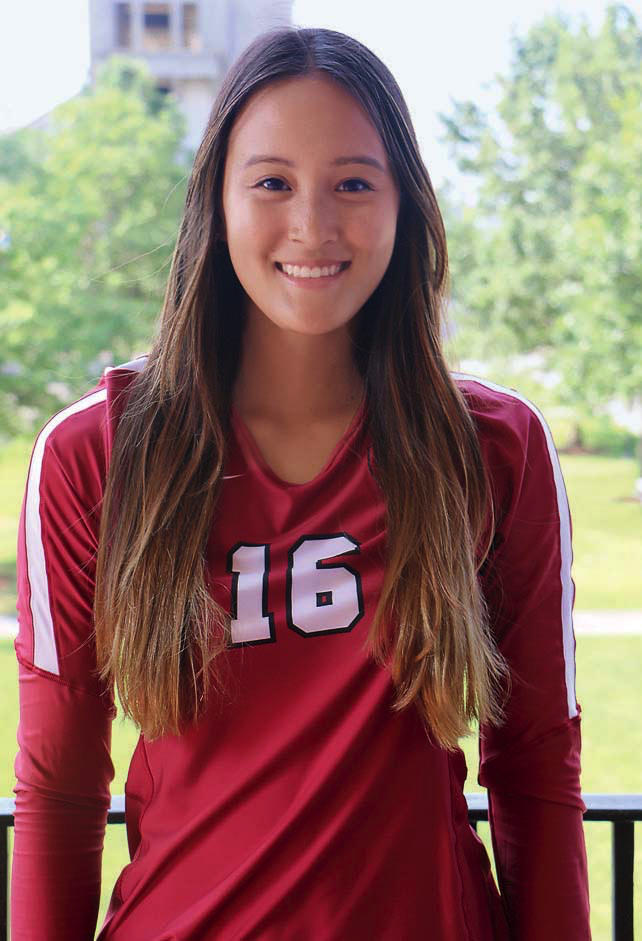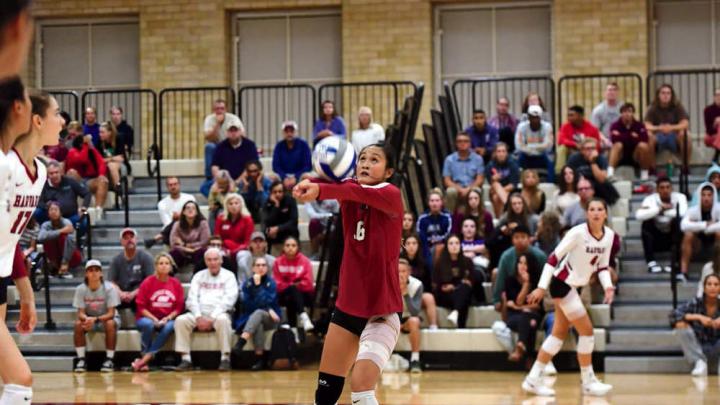On the volleyball court, Sandra Zeng ’21 lives by one rule: never let the ball touch the ground.
So when opposing hitters go up for a spike, she trains her eyes on their shoulders. “The shoulders tell a lot,” Zeng says. If they’re angled toward one direction, even slightly, a whack toward that side of the court is likely. Zeng can’t “cheat” too soon, though. If the hitter spots a premature shift, she can easily pop it to the other side, leaving Zeng way out of position.
No matter how well Zeng judges a hitter’s intentions, though, she’ll probably end up on the ground. She has spent years perfecting rolling, sprawling, and all manners of diving: techniques to keep the ball in the air and in play. “But in the end, if you get the ball up, you get the ball up,” she says. “There’s not really one perfect way to do it.” She would know. In 23 matches for the Crimson in 2019, she recorded double-digit digs—saves of particularly difficult shots—in all but three matches, finishing sixth in the Ivy League with 273 for the season.

Sandra Zeng
Photograph by Gil Talbot/Harvard Athletic Communications
Zeng’s defensive prowess traces back to her upbringing in Hawaii. Powerhouse programs in the continental United States often focus on a high-flying, offensive style of play, but Hawaiian teams generally don’t have that option. “We’re mostly Asian and Pacific Islander here, so we’re not as tall as our Caucasian counterparts,” she says, laughing. “So we’re really focused on our defense.”
Zeng, who stands five-foot-nine, was always one of the tallest on her team in Honolulu, but she never focused solely on punishing offense. Her high-school coach emphasized team endurance, orchestrating long drills where each player would sprint back and forth in rotations, passing and setting the ball 300 times without stopping for a break. It required each athlete to maintain absolute focus no matter her level of exhaustion; any errant pass meant starting the drill over.
The strength each athlete developed played to the game plan, in which the team tried to out-defend and out-work their opponents, keeping rallies going until the other team, exhausted, finally slipped up. If a ball was even reasonably in play, players were expected to lay out. “They say, ‘If you don’t go, you don’t know,’” Zeng says. “Because you never know, maybe you could get it.”
Hawaiian volleyball was also about team and family. Zeng began the sport only because she tagged along to practices with an elementary-school friend. By high school, when it came time for her to choose between tennis and volleyball, the choice was easy. She liked being part of a group where each member fully supported one another—where it wasn’t just about her emotions, but those of her teammates, too.
The bonds stretched beyond the court. Her teammates’ parents were always addressed as “auntie” or “uncle.” “And when you call a parent ‘auntie’ or ‘uncle,’ they really feel like an auntie or uncle,” she says. “You feel super connected to them, and everyone feels like a family.” When practices ended, the team would take trips to the mall or go out to dinner. After weekend tournaments, they’d stay at each other’s’ houses for sleepovers or gather for parties on the beach. Family and team were indistinguishable.
When Zeng arrived at Harvard, she didn’t know what to expect from volleyball. One of the final additions to her recruiting class, she hadn’t met her teammates before arriving on campus, and felt she might be left out. Her late recruitment didn’t give her much hope to receive significant playing time.
But she was grateful for any role. “I was totally preparing to be a chill, silent, supportive teammate,” Zeng says. Within weeks, her teammates had become her closest friends on campus. “At that point, I was so happy to even be on the bench.” But as the season progressed, she began receiving consistent playing time as a back-row defensive specialist. A hitter herself in Hawaii, her knack for “reading the hitter” made her stand out.
In time, her confidence grew. Long reluctant to communicate too much on court, preferring to focus on her play, she realized that becoming a vocal presence could really affect a game’s outcome. By her junior year, Zeng, a history and science concentrator in Currier House, was the team’s libero: its defensive anchor. At season’s end, she was elected co-captain.
No one could have expected that there would be no volleyball. When Zeng first heard, her immediate instinct was to take a gap year: it was hard to imagine missing her final varsity season, especially as captain. But perhaps more crucial than the on-court element were the after-practice dinners, the late-night talks. She had always wanted to be one of the seniors to whom freshmen turned for advice.
But as the shock of the announcement faded, Zeng decided to enroll remotely, even without a volleyball season. Having always wanted to take a gap year between college and medical school, she felt too close to graduation to lose momentum. In the end, almost half the team decided to complete the semester too, despite the missed season.
As Zeng finishes her final year from her brother’s house in Irvine, California, she still has plenty of time to talk to her teammates. One of them, completing the semester nearby, asked if Zeng was sad that she’d never get to play with her Crimson squad again. “I said, ‘Yeah it’s sad, but I’m still hanging out with you guys, I’m still creating memories.’” And though she can’t help freshmen in person, they know she’s still there to help. “Actually, this past weekend,” she said in October, “a freshman called me for advice. I was so touched—‘Sweetheart, of course I’ll answer your question.’” Even without a court, Zeng is still a captain.







